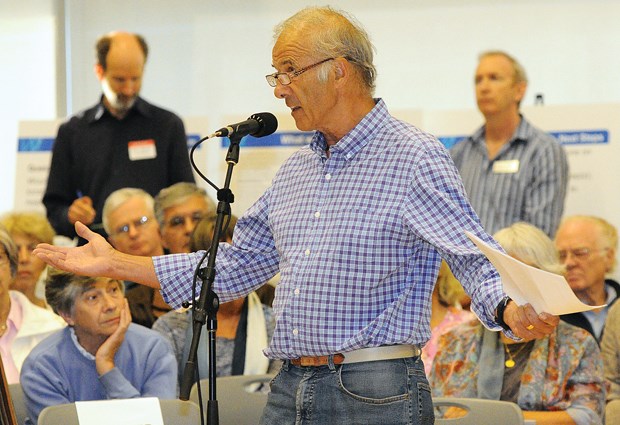West Vancouver council has identified the monster in their midst but just what they’ll do with it is still unclear.
A discussion of neighbourhood character and building bulk — colloquially known as the monster homes debate — drew more than 100 interested parties to a town hall meeting at West Vancouver Community Centre Tuesday.
While developers dominated previous get-togethers, Tuesday’s affair largely featured townsfolk calling for a respite from a ceaseless parade of construction they say saps the serenity from previously bucolic hamlets.
The rash of tear-downs has put West Vancouver’s culture in jeopardy, according to Barbara Hunter, who was speaking on behalf of the West Vancouver Historical Society.
“Heritage helps us foster civic responsibility and citizenship,” Hunter said.
Builders frequently wipe out the past while new buyers offer little solace to the present, according to Hunter, who said a string of empty houses wouldn’t help revitalize Ambleside.
“West Vancouver is one of the best places in the world to live, not just to invest,” she said.
In concluding her remarks, Hunter asked council how much of West Vancouver we want to retain.
The municipality needs to look to the future, countered Marque Thompson, principal of residential design firm Marque Design.
While acknowledging it was a sensitive subject, Thompson pointed out that many speakers at Tuesday’s meeting are a little older.
“We have to be thinking about West Vancouver in 2035 and 2050,” he said.
Trees were a frequent topic of conversation Tuesday, with many residents voicing concerns about the loss of the municipality’s forest esthetic.
“In order to build new, trees have to be sacrificed,” Thompson said. “If a tree is old and it’s removed and a new one is put in its place, that’s probably better.”
Thompson also addressed the subject of demolition, which he said usually happens when a house has been poorly maintained and renovation is no longer an option.
Demolition has been sweeping the district, according to former councillor Rod Day.
There have been 408 demolitions in the last three years and the numbers have risen each year, according to Day.
“If nothing else, council should substantially increase demolition fees to help compensate neighbourhoods,” he said.
Council is tentatively scheduled to debate bylaw changes meant to articulate and protect neighbourhood character in June. Tools at council’s disposal include new rules on construction, lot coverage, fence heights and yard grading.
At least one resident raised the alarm that council seemed to be resorting to “draconian changes.”
“Private property is still pretty sacred in Canada and I do believe it needs to be respected,” said Claus Jensen.
While another speaker described the problems that could be wrought from “tinkering with market forces,” the majority of Tuesday’s attendees echoed the call for more stringent rules.
“I, for one, am willing to pay a higher property tax if it means that I will preserve neighbourhoods,” said Scenery Slater.
Skyrocketing real-estate prices are the reason many new houses get built, according to West Vancouver’s manager of development planning Chris Bishop.
“I don’t think it’s necessarily reasonable to expect a 1950s bungalow to be rebuilt on that lot,” Bishop said, discussing multi-million dollar lot sales.
“But we have to find a way that new development can coexist alongside more historic development,” he said.



